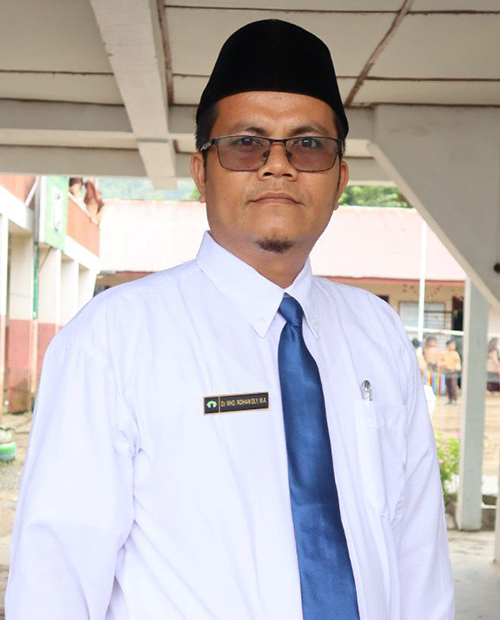Optimization of Scaffolding Method in Aqidah Akhlak Learning to Improve Clean and Healthy Living Behavior of Students at MIS Nurul Huda
DOI:
https://doi.org/10.62945/jcii.v1i1.200Keywords:
Scaffolding, Aqidah Akhlak, healthy and clean living, basic educationAbstract
Awareness of the importance of healthy and clean living is a fundamental aspect in basic education, especially in learning Akidah Akhlak. However, there are still many students who do not understand and apply healthy living habits due to less interactive learning methods. This study aims to analyze the effectiveness of the scaffolding method in increasing awareness of healthy and clean living in grade 1 students of MI Nurul Huda. The research method used is a qualitative approach with data collection techniques through observation, interviews, and documentation. Data analysis was carried out thematically with the stages of data reduction, data presentation, and drawing conclusions. The results of the study showed that the scaffolding method was effective in increasing student understanding and participation. The application of techniques such as gradual guidance, group discussions, and direct practice helped students better understand the concept of cleanliness and health. In addition, the results of academic tests showed a significant increase in student understanding after this method was applied. The challenges faced include differences in student understanding levels, so that more varied learning strategies are needed. In conclusion, the scaffolding method can be an effective approach in instilling healthy and clean living values in students from an early age.
Downloads
References
Arikunto, S. (2002). Prosedur Penelitian. Bandung: Rineka Cipta.
Apriyanti, I., & Rahayu, S. (2024). Efforts to Improve Student Learning Outcomes through the Problem Based Learning Model in Islamic Education Learning at SD Negeri 104325 Kampung Manggis. Journal of Indonesian Primary School, 1(2), 61–68.
Elistiana, V., Novita, N., & Ginting, F. W. (2024). A Development of E-Module Learning Media based on SETS (Science, Environment, Technology, and Society) on Sound Wave Material. Indonesian Journal of Education and Social Humanities, 1(2), 20–32.
Erawadi, E., Hamka, H., & Juliana, F. (2017). The Analysis of Student’s Stressed Syllables Mastery at Sixth Semester of TBI in IAIN Padangsidimpuan. English Education: English Journal for Teaching and Learning, 5(1), 44–57.
Hamka, H. (2023). The Role of Principals on Teacher Performance Improvement in a Suburban School. QALAMUNA: Jurnal Pendidikan, Sosial, Dan Agama, 15(1), 371–380.
Hamka, H., Suen, M.-W., Anganthi, N. R. N., Haq, A. H. B., & Prasetyo, B. (2023). The Effectiveness of Gratitude Intervention in Reducing Negative Emotions in Sexual Abuse Victims. Psikohumaniora: Jurnal Penelitian Psikologi, 8(2), 227–240.
Harahap, D. S. (2024). Implementation of ChatGPT to Improve Students’ Critical Thinking Abilities. Indonesian Journal of Education and Social Humanities, 1(2), 33–39.
Harahap, S. M., & Hamka, H. (2023). Investigating the Roles of Philosophy, Culture, Language and Islam in Angkola’s Local Wisdom of ‘Dalihan Na Tolu.’ HTS Teologiese Studies/Theological Studies, 79(1), 8164.
Indrawati, N., & Desky, A. Y. D. (2024). How to Improve Elementary School Student Learning Outcomes by Implementing the Articulation Type Cooperative Learning Model? Journal of Indonesian Primary School, 1(2), 32–37.
Jannah, A., Lubis, A. H., & Julia, N. M. (2024). Development of Number Card Media in Mathematics Learning for Elementary School Students. Journal of Indonesian Primary School, 1(3), 12–23.
Latifah, I., & Safrida, I. (2025). Improving Students’ Language Skills with Punakawan Wayang Media at RA Mansyaul Huda: A Classroom Action Research. Journal of Indonesian Primary School, 2(1), 13–24.
Lubis, A. H. (2024). Improving Elementary School Students’ Reading Skills Using Picture Word Cards: How is This Possible? Journal of Indonesian Primary School, 1(2), 9–18.
Lubis, A. H., & Lubis, S. S. W. (2024). Development of Newsletter Media in Thematic Learning for Elementary School Students. Indonesian Journal of Education and Social Humanities, 1(1), 28–36.
Mauliana, I., Ulfa, N., & Fitria, A. (2024). Improving Student Learning Outcomes with the Problem Based Learning Model: Classroom Action Research at the State Islamic Primary School. Indonesian Journal of Education and Social Humanities, 1(2), 1–8.
Misqa, L., Oviana, W., Hayati, Z., & Jannah, M. (2024). Improving Student Learning Outcomes in Mathematics Learning through a Contextual Teaching and Learning Approach in Elementary Schools. Journal of Indonesian Primary School, 1(2), 19–26.
Muliawati, I., & Aldin, A. (2024). The Effectiveness of the Problem Based Learning Model on Elementary School Students’ Mathematics Learning Outcomes. Journal of Indonesian Primary School, 1(2), 27–31.
Nurliza, M., Lubis, A. H., & Lubis, S. S. W. (2024). Word Square Model Used by Poster Media to Improve Primary School Student Learning Outcomes. Journal of Indonesian Primary School, 1(1), 19–28.
Rahayu, L., & Daud, R. M. (2024). SAS Method assisted by Picture Story Books to Improve Elementary School Students’ Beginning Reading Ability. Journal of Indonesian Primary School, 1(1), 37–46.
Rahmah, S., & Lubis, A. H. (2024). Problem Posing as a Learning Model to Improve Primary School Students’ Mathematics Learning Outcomes in Gayo Lues. Journal of Indonesian Primary School, 1(4), 93–104.
Simamora, R. (2024). A Survey Research: What is the Role of the Mendeley Application in the Student Environment? Indonesian Journal of Education and Social Humanities, 1(2), 40–45.
Simaremare, S., & Siregar, R. (2024). Effectivity of the Microsoft Excel Application on Student Understanding in Statistics Courses. Indonesian Journal of Education and Social Humanities, 1(2), 9–19.
Sugiyono. (2018). Metode Penelitian Kuantitatif Kualitatif dan R&D. Bandung: Alfabeta.
Downloads
Published
Issue
Section
License

This work is licensed under a Creative Commons Attribution-ShareAlike 4.0 International License.










